by Naomi L. | October 7, 2015 | Blog, Creative Writing, Off The Bookshelf |
I know it’s been a while since I’ve shared a book on my Off The Bookshelf segment, so this week, I’m going to discuss one of my favorites. I’ve talked about this famous story in depth a few times before, notably to discuss five points that are often missed and the reasons why it’s a greater story than many people think. Once again, I’d like to revisit this classic tale of forbidden love, this time in a double dose. I hope you’ll enjoy this review of one of my favorite books off my shelf: Romeo & Juliet/West Side Story.
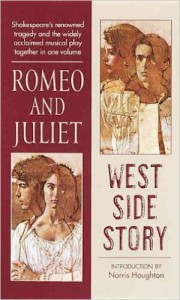
Romeo & Juliet/West Side Story
Summary
First published in 1965, Romeo & Juliet/West Side Story comprises two stories in one: the stage play Romeo & Juliet by William Shakespeare; and the 1957 Broadway musical West Side Story by Arthur Laurents. The book also includes explanatory notes for unfamiliar expressions in Shakespeare’s play and a foreword by renowned theater director Norris Houghton.
Romeo & Juliet tells the story of two teenagers in Renaissance Verona who fall in love despite the age-old feud between their families, but who are driven to an untimely end by fate and the violent circumstances surrounding them. Inspired by Shakespeare’s play, West Side Story tells the same tragic tale of a doomed romance between young lovers, but updates the setting to modern-day New York and the protagonists to a white American boy and a Puerto-Rican girl torn apart by the racism-fueled rivalry between the street gangs with which they’re associated. As much for Romeo and Juliet as for Tony and Maria, love blossoms at first sight and against the odds, only to be threatened and destroyed by hatred that brings tragedy not just to the young lovers, but to their war-torn society as a whole.
Review
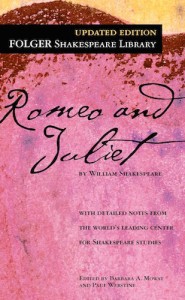 I first read this book as a teenager, shortly after watching the 1961 movie West Side Story as homework for singing lessons (I was to sing “Somewhere” at my first presentation). Long familiar with the plot of the original play, I had fallen in love with the story of forbidden romance and was eager to finally read Shakespeare’s timeless classic for myself. Of course, I’ve made my love for the story itself abundantly clear in the past, so this review will focus a little more on the format of this book than on the pieces within it.
I first read this book as a teenager, shortly after watching the 1961 movie West Side Story as homework for singing lessons (I was to sing “Somewhere” at my first presentation). Long familiar with the plot of the original play, I had fallen in love with the story of forbidden romance and was eager to finally read Shakespeare’s timeless classic for myself. Of course, I’ve made my love for the story itself abundantly clear in the past, so this review will focus a little more on the format of this book than on the pieces within it.
What I find most interesting about this particular book is the way the same story is presented over two very different backdrops: one in Renaissance Italy, the other in 1950s New York. By combining both stories into one volume, Romeo & Juliet/West Side Story offers a unique way to visualize the tale of star-crossed young love across time. The similarities and differences between these popular pieces become clearer as the reader is able to quickly swap a scene in one play for its parallel in the other: the feud between the Montagues and the Capulets becomes a turf war between the Jets and the Sharks, the Capulet ball becomes the dance at the gym, the poetic exchange at Juliet’s balcony becomes a duet on Maria’s fire escape. Each story is beautiful in its own right, but I’ve found that to be able to compare and contrast them so easily makes the fundamental plot all the more fascinating.
 Romeo & Juliet was the first Shakespearean play I ever read, so naturally I was yet unfamiliar with Elizabethan English. This is where the notes in the back of the book came in extremely handy. Essential words and terms are referenced to the line with modern English translations and explanations wherever necessary, so the notes were a tremendous help when it came to deciphering the meanings within Shakespeare’s verse. It’s worth noting that they’re still helpful to any new reader who plans to read more of Shakespeare, as several of the expressions used in Romeo & Juliet commonly appear in his other works. Unfortunately, a similar device isn’t available for West Side Story, which relies on its readers’ familiarity with the music to be fully enjoyable, but this is merely a minor drawback to what is otherwise an equally stunning theatrical masterpiece.
Romeo & Juliet was the first Shakespearean play I ever read, so naturally I was yet unfamiliar with Elizabethan English. This is where the notes in the back of the book came in extremely handy. Essential words and terms are referenced to the line with modern English translations and explanations wherever necessary, so the notes were a tremendous help when it came to deciphering the meanings within Shakespeare’s verse. It’s worth noting that they’re still helpful to any new reader who plans to read more of Shakespeare, as several of the expressions used in Romeo & Juliet commonly appear in his other works. Unfortunately, a similar device isn’t available for West Side Story, which relies on its readers’ familiarity with the music to be fully enjoyable, but this is merely a minor drawback to what is otherwise an equally stunning theatrical masterpiece.
Both Romeo & Juliet and West Side Story have had a profound impact on audiences: one for its poetic deconstruction of romantic ideals, the other for its dramatic commentary on the consequences of social intolerance. The presentation of both plays in one volume brings to light the true timelessness of Shakespeare’s classic, proving that the story of love born against hate will be forever relevant as long as people and society continue to be powerfully motivated by both.
Inspiration
Romeo & Juliet is the archetype of forbidden love thwarted by circumstance, so it’s no wonder the story has translated so well into the modern setting of West Side Story. Whether set between feuding families or warring street gangs, this tragic love story reads not only as the epitome of the passion and dangers of young romance, but as a lesson on how hatred kills. Perhaps for its universal themes of love, intolerance, and the cruelty of fate, the plight of the star-crossed lovers is a tale that has fascinated readers for centuries and certainly will for many more to come. It has served as inspiration for much of my romantic fiction, and to this day I indulge in it whenever I feel the need to satisfy my cravings for drama and romance.
For all the above reasons and more, Romeo & Juliet is and likely always will be my favorite story at its core, regardless of the characters, settings, and details that flesh it out. To be able to enjoy my two favorite versions of the story in a single volume is simply the cherry on top of a classic poetic delight.
by Naomi L. | April 10, 2015 | Flash Fiction, J.C. Wolfe's Writing |
(What If? Exercise: Read the description here.)
Mama said not to touch the cookie jar. I should have listened.
I only meant to take one. I didn’t think the jar would be so heavy.
I tried not to cry while Papa yelled at me in the kitchen. It was scary how his angry voice always carried through the house. The whole time, Mama was there cleaning up the porcelain shards and cookies scattered across the floor. She never said a word.
Papa sent me to my room, said I would stay there for the rest of the week. Only when I closed the door behind me did I finally open my right hand, where the stolen cookie rested half-broken in my palm. I’ll never forget eating it.
I remember the sweet smell of day-old dough as I finally heard Mama’s voice downstairs, telling Papa he had been too hard on me. I remember the taste of oatmeal filling my mouth as he yelled that she was always too soft with us. I remember the crunch of hard chocolate chips between my teeth as the shouting and crying grew louder. I remember swallowing the final bite just as the sounds of crashing and shattering glass pierced the night. And I remember picking the last crumbs off my shirt as I heard the front door slam. Salty tears marred the sweetness of the chocolate as Mama’s sobbing echoed through the house, the only sound I would remember hearing for the rest of the night.
It’s been five years since Papa left. I haven’t had a cookie since.
This story is based on What If? Exercise 41: “Peter Rabbit and Adam and Eve: The Elements of Plot”. The exercise is to write a story using four basic plot elements: a prohibition, doing the prohibited, personal/immediate consequences, and long-term/authority consequences. The objective is to become aware of common patterns in storytelling and to understand the importance of basic elements that underlie plots. I hope you enjoy what I’ve written. Thanks for reading!
Back to the story
by Naomi L. | October 8, 2014 | Blog, Creative Writing, Featured |
A year ago tomorrow, I shared a post on five points that are often overlooked in William Shakespeare’s timeless play, Romeo & Juliet. Now I’m back and inspired to strongly defend it a second time. Nowadays, it’s “cool” to criticize this story and dismiss it as a silly tale about two naïve infatuated teenagers whose irresponsible actions cause the deaths of six people, themselves included. I know because I used to be one of said critics. Since recently starting to learn more about this play, however, I’ve come to the conclusion that people need to stop being so cynical and start making an effort to appreciate the story Shakespeare was really trying to tell.
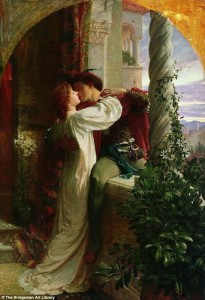
“Romeo and Juliet”, 1884, oil on canvas painting by Frank Bernard Dicksee
Fortunately, there are plenty of people who do understand what Romeo & Juliet is really about and who are more than willing to share their opinions on it. If you want to discover the real meaning of this story, start by following the “Defending RJ” tag on Tumblr. RomeoandJulietFan’s blog is also a must-read, as she does an excellent job of curating the best content defending this play. There are plenty of good points to be made on this side of the debate, but most arguments cover the same basic few.
So in the interest of revealing the true depth of this classic tale, today’s topic once again covers some important points often missed in my favorite Shakespearean play. Enjoy!
(Warning: the following post contains possible spoilers for Romeo & Juliet. If you’re one of the few people on the Internet who are not familiar with this tragic story, proceed with caution. Or you can just read a full summary of the plot here.)
True Love or Teen Fling?
This question seems to be at the heart of most R&J arguments, and understandably so. Still, it hardly makes sense to criticize a key element of a 16th-century play by 21st-century standards. While today it may seem silly to think two people can truly fall in love at first sight, remember that Shakespeare wrote his plays at a time when people thought fate was controlled by the stars and instant love was believed to be normal. It’s entirely possible that he did intend for his adolescent protagonists to be soulmates and for their love to be seen as genuine. There are several clues in the text to support this (one of my favorites being how the lovers’ first conversation reads as a sonnet), but the only way to know for sure would be to ask the playwright himself, so there may never be a definite consensus. It all comes down to interpretation.
So were Romeo and Juliet really in love, or did they just share a fiery passion that was doomed to burn out? This is the major point that most people miss: it doesn’t matter. Romeo & Juliet is a tragedy because whether their marriage was a testament to eternal love or a mistake made in the heat of the moment, they never got to find out. Had they lived in a different time or place where they didn’t constantly have to circumvent hostility, they could have been free to let their relationship run its course, however it might have played out. Instead, they meet an untimely end after an unfortunate mix-up forces them to make an unthinkable choice between (so they believed) facing life alone or being together eternally in death. Whatever their relationship was or could have been, it ended far too soon.
Which brings me to the next point…
Romeo & Juliet condemns Hate, not Love!
It baffles me how so-called R&J haters tend to blame the main characters for all the tragedies that unfold throughout the story (which I admit is ironic, given that I used to do the same). RomeoandJulietFan highlights this point perfectly in one of her rants: somehow everyone forgets that all the violence is a continuation of a feud established in the very first scene of the play, and not the fault of a couple of teenagers who were actually the only people from either family trying to escape the rivalry. Yes, Romeo and Juliet do make some poor choices themselves, but judging the completely natural impulsiveness of young people while excusing the irrational and destructive enmity of adults? Come on.
Now don’t get me wrong; in no way am I condoning the romanticization of teen suicide. But technically neither was Shakespeare. The message that should be taken from Romeo and Juliet’s deaths isn’t that lovers in a forbidden relationship should kill themselves, nor that teenagers who would willingly die for each other are stupid. It’s that hatred kills.
Think about it: none of the events leading up to the final tragedy would have happened if the Capulets and the Montagues had just gotten along from the start. Romeo and Juliet wouldn’t have had to keep their relationship a secret, Mercutio and Tybalt wouldn’t have died fighting for their houses’ honor, Friar Laurence wouldn’t have had to concoct the escape plan that failed, and these poor children never would have ended up in the depressing situation that drove them to suicide. By this logic, there’s only one conclusion that can be drawn from the plight of Romeo and Juliet: their families killed them.
So no, the real fools of the story are not the misguided teenagers who chose to pursue love against impossible odds. They’re the adults who should have known better, who should have invested their energy in lovingly raising their children instead of prolonging a feud that, as far as we can tell, had no justification to begin with. Not once throughout the entire play do we see Romeo directly interact with his parents; in fact, his only on-stage relationship with an adult is with Friar Laurence. Likewise, Juliet’s closest parental figure is her nurse, while the few conversations in which we ever see her parents express concern for her always have to do with marrying her off (to a complete stranger, no less). Even the friar and the nurse are guilty of making bad decisions, the former hatching high-risk plans that endanger the lovers’ lives and the latter abandoning her surrogate child in her hour of greatest need. However reckless the young protagonists may have been, it isn’t fair to criticize their poor judgment when it’s clear in the end that no one was there to protect them, whether it was from the feud or from themselves.
Taking all this into account, it’s actually quite amazing how greatly Romeo and Juliet contrast with every other character in the story. So perhaps we shouldn’t be focusing on their flaws so much as on their strengths…
Meet the real Romeo Montague and Juliet Capulet
R&J Hating 101 says that for every criticism of a bad decision made by one of the title characters, at least one reference must be made to their extreme youth. Yes, Romeo and Juliet were young, arguably too young for their story to have played out any other way. If you’ve jumped on this bandwagon, you’re no doubt overly familiar with the phrase “They were just kids!”, perhaps even having used it yourself.
Well, guess what? You were a kid once too. There was a time when you too believed that love could conquer all, that there might be one perfect person out there for you and if you found them, everything in your life would magically fall into place because destiny said you were supposed to be together forever. The major flaw in the logic behind R&J bashing is that the very trait for which the main characters are criticized is precisely what makes them realistic and relatable. Romeo and Juliet behaved exactly as would be expected of people their age, and if you can’t for one second imagine yourself in their place and sympathize with these idealistic lovers, then frankly I feel sorry for you.
So now that we’ve established that Romeo and Juliet were young, naïve and impulsive (i.e. normal teenagers), let’s take a closer look into the iconic characters Shakespeare so carefully constructed.
Romeo Montague is the literary epitome of the passionate lover. This is clear from his introductory scene, which already has him reciting romantic poetry and lamenting over an unrequited love. Yes, he claimed to love a girl named Rosaline before he fell for Juliet, but as I’ve pointed out before, this switch is important to demonstrate the difference between an infatuated boy and a young man in love. It also gives us an insight into his most defining characteristic: he loves to love. The fact that Romeo grew up surrounded by hatred and still chose to pursue romance above all else speaks volumes of his inherently good nature, and that alone entitles him to a little credit, even admiration.
Some character analyses point out that Romeo’s intense love for Juliet is an extension of his tendency to exaggerate emotion altogether, and it’s this for which he’s usually berated by critics. True, he should not have let his rage over Mercutio’s death drive him to murder Tybalt, nor should he have been in such a hurry to die after hearing the news of his wife’s “death”. Yet one must ask: if Romeo had not been such an emotional person, would his war-abolishing affair with Juliet ever have happened in the first place? Of course we shouldn’t condone his terrible choices, but we should at least acknowledge that he’s a well-rounded character whose personality consists equally of virtues such as loyalty, courage and honesty. The complexity of Romeo’s character is what makes him such a solid pillar of one of the most enduring love stories ever written… as is the case of his complementary “other half”.
Juliet Capulet undoubtedly undergoes the most substantial development of any character in the story. Of all the misinformed comments I ever used to make against this play, the most embarrassing is by far mistaking this brave young woman for a foolish submissive child. Much like Romeo, Juliet is established early on as an independent thinker by showing no interest in the same matters as her family (in her case, marriage). Unlike her lover, however, she tends to be more rational and does not let her emotions completely drive her actions, which is actually quite outstanding for a teenager in love.
Juliet is only thirteen, yet people judge her decisions as though she should have made them with the experience of a woman three times her age. Hardly anyone seems to recognize how impressive it is that a girl that young is clever enough to pull an older boy out of his romantic illusions and into a serious commitment. Within the first few minutes of meeting Romeo, Juliet already calls him out on his clichés with a shrewd “You kiss by th’ book” (1.5.114) and consequently inspires in him some of the most iconic love poetry in the history of English literature. Also notice in the famous balcony scene (Act II, Scene II) that Juliet does not let her profound love for Romeo blind her into wholeheartedly accepting his declarations of love, but instead challenges him to prove his devotion by marrying her. Her decision to reunite with her husband after his banishment is not made in haste; however reckless you think she may have been, you can’t deny it takes remarkable courage to give up the security of family and social status in order to pursue happiness. Even Juliet’s suicide takes more daring than Romeo’s (stabbing being far more painful than poisoning), yet she remains loyal to him until the very end, never doubting for one second that her rightful place is eternally by his side.
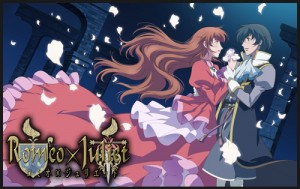
The star-crossed lovers as they appear in the anime adaptation, Romeo x Juliet
From my interpretation, Romeo and Juliet are a good match because they complete each other; Romeo is passionate and loyal, while Juliet is levelheaded and astute. As RomeoandJulietFan points out, the main characters likely connected so well because they were each exactly what the other needed at the time of their meeting. They were not simply hormonal teenagers acting out of lust; otherwise they could just as easily have given in to desire instead of getting married, or gone their separate ways at the first obstacle that forced them apart instead of striving to be together even in death. You can choose to believe it wasn’t true love, but you can’t say that what Romeo and Juliet had was anything but genuine.
Romeo & Juliet is far from an idealized love story, but that’s exactly the point. Young passion thwarted by circumstance is unquestionably the central theme of the play, and one can’t hope to appreciate Shakespeare’s beloved creation without making an effort to fully understand the intricate tale of star-crossed love that, 400 years after premiering on stage, still stands as a highly relevant theme in today’s artistic culture.
And if you still need convincing that all the hate around Romeo & Juliet is unjustified, do yourself a favor and read this post. It pretty much says it all.
I hope you’ve enjoyed reading about these important points of Romeo & Juliet! As you can see, this play is one of my favorites for several reasons, and I defend it in the hope that others may come to love it as much as I do. If you weren’t already, I hope I’ve made a Romeo & Juliet fan out of you! Thanks for reading!
References/Further Reading
by Naomi L. | October 9, 2013 | Blog, Creative Writing, Featured |
The new Romeo & Juliet movie is coming to UK and US theaters this Friday (which I admit makes me totally jealous, since there’s no set release date for where I live yet). In the spirit of celebrating one of William Shakespeare’s most famous plays, today’s topic is centered around this classic tale of love, fate and tragedy.
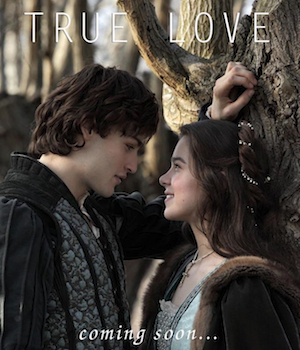
Douglas Booth and Hailee Steinfeld as Romeo and Juliet
Now I’m going to make a confession: I absolutely love this story. I love any story about forbidden love (as long as it’s well-told), and being the epitome of such a tale, Romeo & Juliet may be one of my favorites. In fact, I love it so much that I’ve read scenes several times over (yes, I read Shakespeare for fun, believe it or not), have actively sought out a fair share of adaptations, and have even used it as inspiration for my own romantic fiction.
But don’t mistake me for a silly fangirl. For the longest time, I believed the common interpretation that Romeo and Juliet were no more than two immature teenagers who recklessly rushed into a superficial relationship at the ultimate expense of their families and the rest of Verona. It wasn’t until I started researching in-depth analyses of the story (again, for inspiration) that I came to understand what I was missing in Shakespeare’s timeless classic, and what most modern readers/viewers might be missing too.
So to set your impressions straight before you head out to see this movie, here is a list of five points in Romeo & Juliet that you probably never noticed before. Get ready to see another side of this story!
(Warning: the following list contains possible spoilers for Romeo & Juliet. If you’re one of the few people on the Internet who are not familiar with this tragic story, proceed with caution. Or you can just read a full summary of the plot here.)
1) Rosaline is an important character
Before Romeo meets Juliet and falls desperately in love with her, he actually has his sights set on a different girl: Rosaline. In fact, his very first appearance in the play has him moping to his cousin Benvolio about the unrequited love he claims to feel for this unseen lady, and he even agrees to crash the Capulet ball with his friends just for the chance to see her.
But other versions of the story tend not to place very much importance on Rosaline. Most adaptations don’t even give her a face, and some exclude her character altogether, instead providing a different explanation for the Romeo character’s depression before he meets his Juliet (e.g. West Side Story: Tony longs for excitement in his life, which he finally discovers upon meeting Maria). This common alternative likely stems from the assumption that Rosaline’s only purpose in the original story is to lure Romeo to the ball so he can cross paths with Juliet, a plot point that can be easily worked around (continuing from the previous example, Tony first encounters Maria at a local dance that he only agreed to attend as a favor to his best friend).
Yet Rosaline actually plays a much greater role than a mere plot device. While pining for her, Romeo has a preconceived notion of what it means to be in love, and acts according to the lessons he’s learned from the hackneyed romantic poetry he likes to recite when thinking of her. At the first sight of Juliet, however, he abandons every thought of his former clichéd infatuation in favor of a much deeper passion that sparks some incredibly beautiful and original love poetry from his own heart (which, when you think about it, may have been Shakespeare’s way of saying “Take that!” to the poets before his time). To put it simply, the switch from Rosaline to Juliet is essential to highlight the main characters’ true feelings for each other by showing the audience the difference between Romeo thinking he’s in love and Romeo actually being in love.
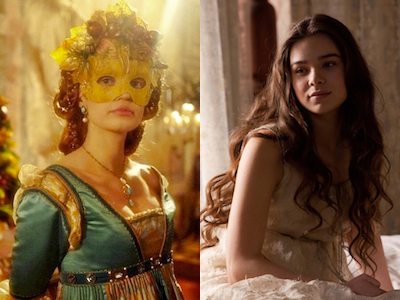
Seriously, did Rosaline ever stand a chance against Juliet?
What you’re probably thinking: He takes one look at Juliet and forgets about Rosaline just like that? Damn, Romeo is so superficial!
What you should be thinking: Wow, Juliet inspires such beautiful passion in Romeo! He must really love her!
2) Mercutio’s Queen Mab speech is a warning
One of the many famous monologues in Shakespeare’s works is the Queen Mab speech delivered by the bold Mercutio in Act 1, Scene 4 of Romeo & Juliet. This is the scene in which he teases Romeo for pining after Rosaline and tries to break his illusions of love by delivering a lecture about the dreams of men and how they can ultimately lead to ruin. Sound familiar?
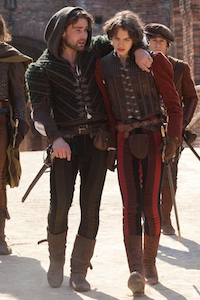
“True, I talk of dreams,
Which are the children of an idle brain” (1.4.97-98)
Mercutio starts by talking about Queen Mab, the mythical fairy queen who rides through the night bringing pleasant dreams tailored to every sleeping individual. But as he goes on, the lighthearted speech quickly takes a morbid turn into a downward spiral through darker visions of depravity (from lovers dreaming of romance to soldiers dreaming of killing), until finally culminating in a bitter yet accurate portrayal of society. Instead of taking from the speech a lesson about realism and the twisted nature of humanity, however, the idealistic Romeo simply disregards his friend’s words as another of his many mischievous taunts, silencing him with a single exasperated comment, “Thou talk’st of nothing.”
Like Romeo, modern audiences might be inclined to dismiss the Queen Mab speech as unnecessary rambling that contributes little to the rest of the story. Indeed, the monologue’s main purpose is to illustrate Mercutio’s wit and roguish nature, but it can also be interpreted as a critique against the romantic ideals that drive the play’s entire plot. In a way, Mercutio’s speech is foreshadowing the tragedies that will occur over the course of the story, and while it isn’t necessarily important, it certainly adds an interesting subtext to the themes of Romeo & Juliet.
What you’re probably thinking: Man, Mercutio really likes to hear himself talk!
What you should be thinking: Mercutio knew a thing or two about realism. Romeo probably should have listened…
3) Paris and Lady Montague even the score
Remember that part near the end of the story when Romeo kills the Count Paris in the Capulet tomb, and that other part when Montague says his wife died of grief after their son was banished from Verona? No? Then you must be familiar with any version of Romeo & Juliet other than the original play itself.
The fact is, most adaptations of this play tend to exclude the deaths of Paris and Lady Montague because they don’t contribute very much to the plot. The latter even goes virtually unnoticed, her offstage death being summed up in only two lines. So why would the playwright even bother killing these characters off in the first place?
Because it’s only fair. Before Romeo and Juliet famously take their own lives at the end, two other important characters suffer dramatic deaths in the middle of the story: Mercutio and Tybalt. But wait, wasn’t Mercutio on the Montagues’ side? Yes, but he was not a member of their family, as Tybalt was of the Capulets’. Mercutio was actually from the third noble family in the play: the Prince’s. This means that after all four of these characters die, the House of Capulet would technically have suffered the greatest loss.
Unless one more family member were to be lost from each of the other two houses. Enter Count Paris and Lady Montague. Paris, though aligned with the Capulets, is another kinsman to the Prince, and ends up being killed in a fight with Romeo during his visit to Juliet’s tomb while she’s faking her death. A little later, after the bodies are discovered in the tomb, the Prince calls forth the heads of the feuding households, at which point Montague accounts for his wife’s absence by explaining that the news of her son’s banishment ended up killing her.
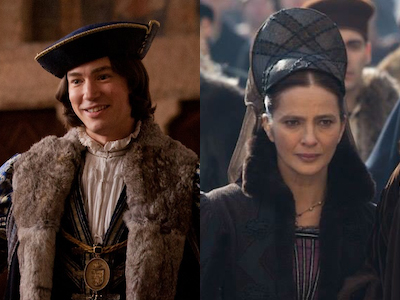
Surprise: one of them might not survive the movie this time. Guess who.
Final death toll:
- Capulets – 2 (Juliet and Tybalt)
- Montagues – 2 (Romeo and Lady Montague)
- Prince – 2 (Mercutio and Paris)
Conclusion: everyone loses, but at least in perfect balance.
What you’re probably thinking: Six people die by the end of the story? Shakespeare was twisted! No wonder most newer versions cut out these deaths!
What you should be thinking: Wow, every house loses two loved ones? How sad!
4) The poison and the dagger are symbolic
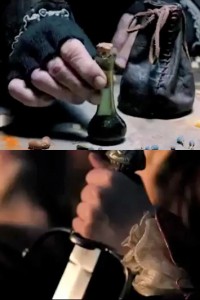
Romeo: “Thy drugs are quick. Thus with a kiss I die.” (5.3.120)
Juliet: “O happy dagger,/ This is thy sheath. There rust and let me die.” (5.3.169-170)
If there’s one thing for which Shakespeare was notorious, it was his innuendos. Plenty of his works contain their fair share of double entendres and the like, and Romeo & Juliet is no exception. However, instead of covering every example in the play (which would take a while, especially for scenes involving Mercutio), let’s just skip ahead to the one hidden in the famous double suicide ending.
You know how Romeo kills himself by drinking poison when he thinks Juliet is dead, and then Juliet stabs herself with Romeo’s dagger after she finds his body? Well, guess what: those two items are not random, but were carefully chosen to secretly represent the lovers’ intimate relationship. Romeo’s weapon of choice comes in a cup, which is a symbol of femininity. In contrast, Juliet uses a blade, a symbol of masculinity, to take her own life. In this way, their deaths are meant to reflect the intimacy they shared in life, thus completing the play’s theme of love ending in tragedy.
Or it’s all just another product of Shakespeare’s deviant mind, depending on how you choose to read into it.
What you’re probably thinking: Shakespeare must have been a misogynist, to have Juliet suffer a much more painful death than Romeo.
What you should be thinking: Even their deaths symbolize their intimate love. Shakespeare was clever with metaphors.
5) Romeo & Juliet is a coming-of-age story
Now I know what you might be thinking: how can Romeo & Juliet be a coming-of-age story if the entire plot only happens over four days? Perhaps it’s not a coming-of-age story in the traditional sense, as the teenage protagonists never actually reach adulthood, but their characters do mature throughout the course of the play, from the moment they meet to their untimely end.
At the beginning of the story, Romeo and Juliet are little more than naïve adolescents, both fairly inexperienced in life and in love. As soon as they first cross paths, however, they quickly propel each other toward the maturity of adulthood. Upon meeting Juliet, Romeo sheds his superficial conceptions of romance to become one of the most truly passionate lovers in all of English literature, and it is this passion that drives his actions for the rest of the play. Juliet, in turn, draws strength from her love for Romeo to develop into a confident and levelheaded young woman, making shrewd observations (“You kiss by th’ book”) and logical decisions that balance out her lover’s spontaneity. The intense love that outweighs the hatred around them makes their marriage all the more pure, and their loyalty to one another drives them to choose an eternity together in death over a miserable life alone. In short, though modern interpretations mistake these young lovers for foolishly infatuated teenagers, in-depth analyses reveal the true qualities of their complex characters, bringing to light the real depth of Shakespeare’s classic story of “death-marked love”.
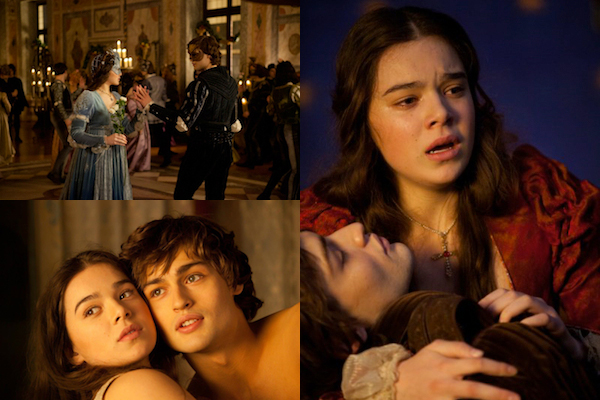
“For never was a story of more woe
Than this of Juliet and her Romeo.” (5.3.309-310)
What you’re probably thinking: They rushed into marriage after less than a day and then killed themselves because they couldn’t live without each other? Romeo and Juliet were so immature!
What you should be thinking: They were so young and they experienced such a grand romance. Romeo and Juliet were truly in love!
All caught up on these secret details?
Great! To leave you on a high note, here is the official trailer for the 2013 release of Romeo & Juliet (the original UK trailer can be found here). Enjoy!
[youtube=http://www.youtube.com/watch?v=Gp9yaZcrtnU]
Reasons I have high hopes for this movie:
- A screenplay adapted by Downton Abbey creator Julian Fellowes
- A stellar cast featuring talents such as Hailee Steinfeld, Douglas Booth, Ed Westwick, Damian Lewis and Paul Giamatti
- Good chemistry between co-stars Hailee Steinfeld and Douglas Booth
- Shot entirely on location in Verona and Mantua, Italy
I hope you’ve enjoyed reading about the secrets hidden in Romeo & Juliet! I understand that many will disagree with some of these points, but honestly, I think that’s part of the beauty of this tale: that it can be interpreted in so many different ways. To some, it’s a tale of love thwarted by fate; to others, it’s a warning about the dangers of being too impulsive. In any case, I’m sure we can all agree that this classic story has greatly endured the test of time, and will probably continue to intrigue admirers of Shakespeare and inspire the romantic at heart for generations to come.
On a final friendly note: kids, trust me when I say you do not want a romance like Romeo and Juliet’s! Yes, this is a beautiful story and a great one to read and learn from, but the story you want to live is that of Grandma and Grandpa, who had a life and grew old together. It’s important to know the difference!
Oh, and if anyone from the UK or US happens to watch this film, please let me know if it’s good. I’m very much looking forward to it. Thanks for reading!
(Disclaimer: All images and video in this blog post are courtesy of Swarovski Entertainment and Amber Entertainment. For news about the film, follow them on Facebook and Twitter. I own nothing; I’m just a fan hoping to spread the love. Thank you!)
 I first read this book as a teenager, shortly after watching the 1961 movie West Side Story as homework for singing lessons (I was to sing “Somewhere” at my first presentation). Long familiar with the plot of the original play, I had fallen in love with the story of forbidden romance and was eager to finally read Shakespeare’s timeless classic for myself. Of course, I’ve made my love for the story itself abundantly clear in the past, so this review will focus a little more on the format of this book than on the pieces within it.
I first read this book as a teenager, shortly after watching the 1961 movie West Side Story as homework for singing lessons (I was to sing “Somewhere” at my first presentation). Long familiar with the plot of the original play, I had fallen in love with the story of forbidden romance and was eager to finally read Shakespeare’s timeless classic for myself. Of course, I’ve made my love for the story itself abundantly clear in the past, so this review will focus a little more on the format of this book than on the pieces within it. Romeo & Juliet was the first Shakespearean play I ever read, so naturally I was yet unfamiliar with Elizabethan English. This is where the notes in the back of the book came in extremely handy. Essential words and terms are referenced to the line with modern English translations and explanations wherever necessary, so the notes were a tremendous help when it came to deciphering the meanings within Shakespeare’s verse. It’s worth noting that they’re still helpful to any new reader who plans to read more of Shakespeare, as several of the expressions used in Romeo & Juliet commonly appear in his other works. Unfortunately, a similar device isn’t available for West Side Story, which relies on its readers’ familiarity with the music to be fully enjoyable, but this is merely a minor drawback to what is otherwise an equally stunning theatrical masterpiece.
Romeo & Juliet was the first Shakespearean play I ever read, so naturally I was yet unfamiliar with Elizabethan English. This is where the notes in the back of the book came in extremely handy. Essential words and terms are referenced to the line with modern English translations and explanations wherever necessary, so the notes were a tremendous help when it came to deciphering the meanings within Shakespeare’s verse. It’s worth noting that they’re still helpful to any new reader who plans to read more of Shakespeare, as several of the expressions used in Romeo & Juliet commonly appear in his other works. Unfortunately, a similar device isn’t available for West Side Story, which relies on its readers’ familiarity with the music to be fully enjoyable, but this is merely a minor drawback to what is otherwise an equally stunning theatrical masterpiece.


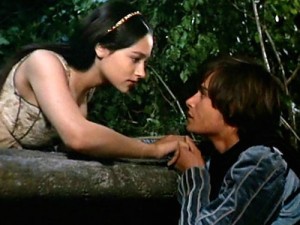
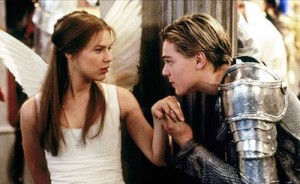
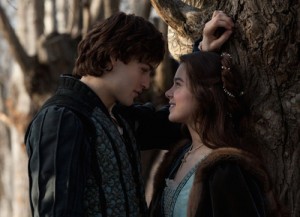









Recent Comments